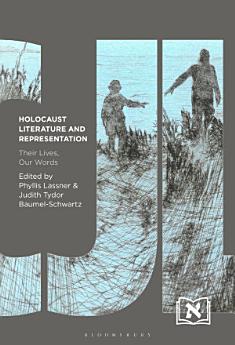Holocaust Literature and Representation: Their Lives, Our Words
Phyllis Lassner · Judith Tydor Baumel-Schwartz
פבר׳ 2023 · Bloomsbury Publishing USA
ספר דיגיטלי
258
דפים
reportהביקורות והדירוגים לא מאומתים מידע נוסף
מידע על הספר הדיגיטלי הזה
Each scholar working in the field of Holocaust literature and representation has a story to tell. Not only the scholarly story of the work they do, but their personal story, their journey to becoming a specialist in Holocaust studies.
What academic, political, cultural, and personal experiences led them to choose Holocaust representation as their subject of research and teaching? What challenges did they face on their journey? What approaches, genres, media, or other forms of Holocaust representation did they choose and why? How and where did they find a scholarly “home” in which to share their work productively? Have political, social, and cultural conditions today affected how they think about their work on Holocaust representation? How do they imagine their work moving forward, including new challenges, responses, and audiences? These are but a few of the questions that the authors in this volume address, showing how a scholar's field of research and resulting writings are not arbitrary, and are often informed by their personal history and professional experiences.
What academic, political, cultural, and personal experiences led them to choose Holocaust representation as their subject of research and teaching? What challenges did they face on their journey? What approaches, genres, media, or other forms of Holocaust representation did they choose and why? How and where did they find a scholarly “home” in which to share their work productively? Have political, social, and cultural conditions today affected how they think about their work on Holocaust representation? How do they imagine their work moving forward, including new challenges, responses, and audiences? These are but a few of the questions that the authors in this volume address, showing how a scholar's field of research and resulting writings are not arbitrary, and are often informed by their personal history and professional experiences.
על המחבר
Phyllis Lassner is Professor Emerita in the Crown Center for Jewish and Israel Studies, Gender Studies, and Writing Programs at Northwestern University, USA. She is author of numerous books and articles on Holocaust literature and representation including as co-editor of the Palgrave Handbook of Holocaust Literature and Culture (2020).
Judith Tydor Baumel-Schwartz is Director of the Arnold and Leona Finkler Institute of Holocaust Research, the Abraham and Edita Spiegel Family Professor in Holocaust Research, the Rabbi Pynchas Brener Professor in Research on the Holocaust of European Jewry, and Professor of Modern Jewish History at Bar-Ilan University, Israel. She is also editor of several compilations of academic autobiographies, including co-editor of Her Story, My Story? Writing about Women and the Holocaust (2020).
Judith Tydor Baumel-Schwartz is Director of the Arnold and Leona Finkler Institute of Holocaust Research, the Abraham and Edita Spiegel Family Professor in Holocaust Research, the Rabbi Pynchas Brener Professor in Research on the Holocaust of European Jewry, and Professor of Modern Jewish History at Bar-Ilan University, Israel. She is also editor of several compilations of academic autobiographies, including co-editor of Her Story, My Story? Writing about Women and the Holocaust (2020).
רוצה לדרג את הספר הדיגיטלי הזה?
נשמח לשמוע מה דעתך.
איך קוראים את הספר
סמארטפונים וטאבלטים
כל מה שצריך לעשות הוא להתקין את האפליקציה של Google Play Books ל-Android או ל-iPad/iPhone. היא מסתנכרנת באופן אוטומטי עם החשבון שלך ומאפשרת לך לקרוא מכל מקום, גם ללא חיבור לאינטרנט.
מחשבים ניידים ושולחניים
ניתן להאזין לספרי אודיו שנרכשו ב-Google Play באמצעות דפדפן האינטרנט של המחשב.
eReaders ומכשירים אחרים
כדי לקרוא במכשירים עם תצוגת דיו אלקטרוני (e-ink) כמו הקוראים האלקטרוניים של Kobo, צריך להוריד קובץ ולהעביר אותו למכשיר. יש לפעול לפי ההוראות המפורטות במרכז העזרה כדי להעביר את הקבצים לקוראים אלקטרוניים נתמכים.







